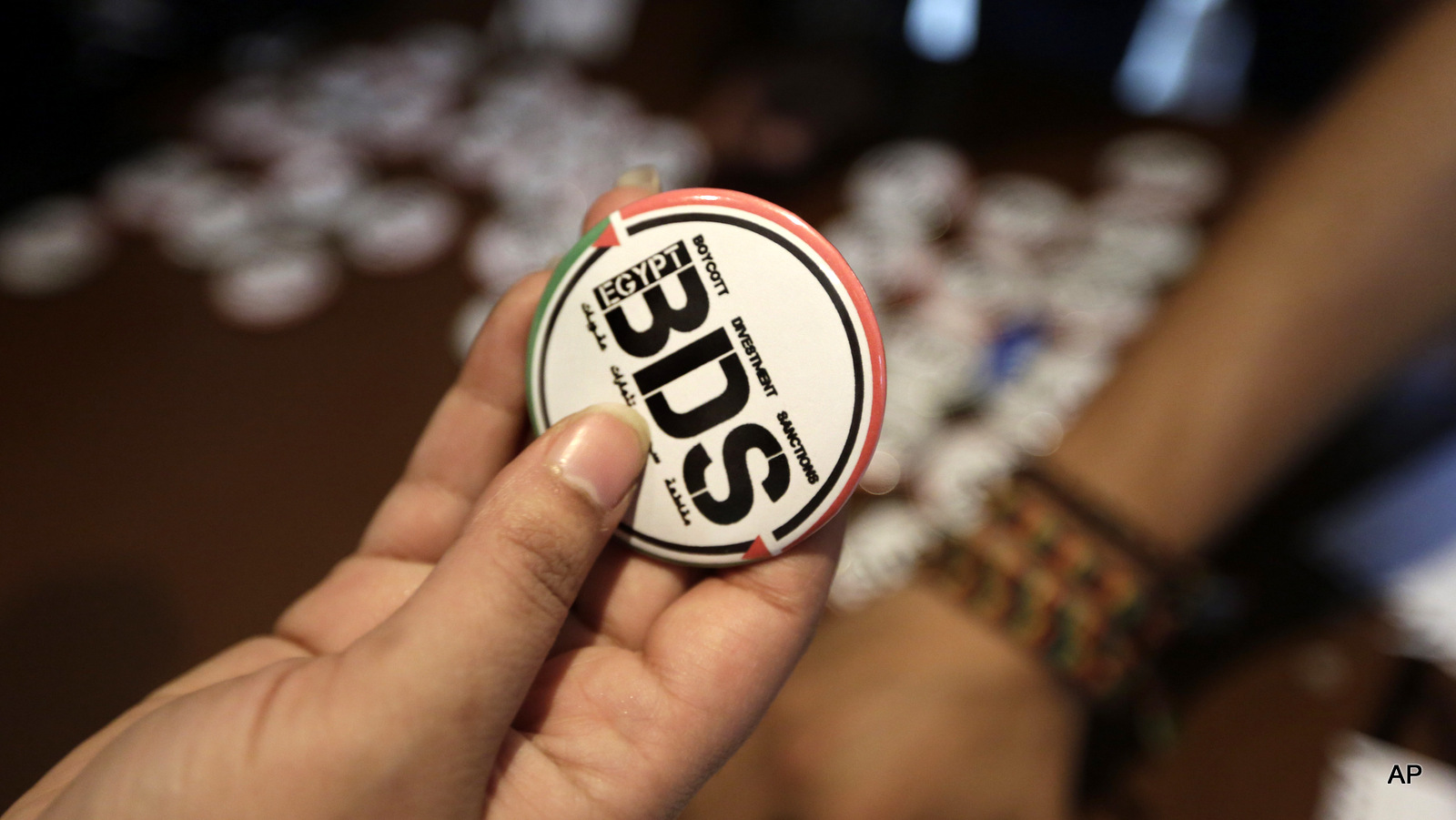US Customs: If It’s Made In Gaza, It Can’t Be Labeled ‘Made In Israel’
by Richard Silverstein, MintPress, Februar 1, 2016. A member of CodePink says the move sends a message, adding: “I hope, however, that they do more than send a message — I hope they enforce their own regulations about accurate labeling of settlement goods.”

American and Israeli peace activists protest against the Israeli beauty
product brand AHAVA, which is made in occupied Palestanian territories
but labeled as ‘Made in Israel’. (AP Photo)
This article was originally published in partnership with Tikun Olam on January 30, 2016.
SEATTLE — The Obama administration took a leap in its campaign against illegal Israeli settlements last week, when the U.S. Customs and Border Patrol issued a reminder about a regulation on labelling products produced beyond the Green Line, or the pre-1967 borders, as produced in the “West Bank” rather than “Israel.”
If enforced, the regulation would bring the U.S. into conformity with European Union directives, which are similarly formulated. And, if enforced, food products, wines, and contentious Ahava beauty products, for example, produced in Israeli settlements could no longer be stamped “Made in Israel” without incurring a penalty equal to 10 percent of the value of those goods.
Currently, responsibility lies with the settlement business or the U.S. importer to ensure proper labeling.
Yet, as the Jewish Forward noted Thursday, these regulations and the 10-percent duty have been on the books since 1995; they’ve simply gone overlooked and unenforced.
“According to an April 1995 U.S. Customs and Border Protection notification, products made in the West Bank or Gaza ‘shall be marked as “West Bank,” “Gaza,” or “Gaza Strip”… and shall not contain the words “Israel,” “Made in Israel,” ”Occupied Territories-Israel” or words of similar meaning.”
The reminder issued last week contains the same phrasing.
Given the regulatory reminder published last week, and the increasing importance of this issue among European and U.S. consumers, the days that West Bank settlement wine can be passed off as made “in the heart of Israel” are numbered.
In the wake of the reminder of the 20-year-old regulation, the Boycott, Divestment and Sanctions movement and NGOs like Adalah-NY and CodePink are expected to redouble their efforts to hold businesses accountable for their practices.
The Forward spoke to Nancy Kricorian, who manages CodePink’s campaign against Ahava, an Israeli cosmetics company whose main factory is located in the Occupied West Bank. She said the recent action by Customs “is the U.S. government’s way of ‘sending a message’ to importers.”
See more on Code Pink’s campaign against Ahava:

“I hope, however, that they do more than send a message — I hope they enforce their own regulations about accurate labeling of settlement goods,” Kricorian told the Forward.
Seeking new strategies where the old ones have failed
The new Customs directive appears to clash with a federal provision passed by Congress last year and signed by President Barack Obama which outlaws boycotts against the products of Israel. The Electronic Intifada, a website that advocates for Palestinian freedom, reported:
“This provision, tucked into the Trade Promotion Authority bill — more commonly known as ‘fast track’ authority — makes it a ‘principal negotiating objective’ of the United States ‘to discourage politically motivated actions to boycott, divest from, or sanction Israel’ in current negotiations with the European Union over the Transatlantic Trade and Investment Partnership.”
Shortly after signing it into law, the Obama administration announced that the provision “runs counter to U.S. policy” because it conflates Israel with the Occupied Palestinian Territories. And, thus, despite being signed into law by Obama, it likely will not be enforced during his administration.
The Israel lobby’s motivation for these types of bills are a response to university student bodies, food co-ops, unions and pension funds that have pledged to honor various forms of boycotts or sanctions related to the settlements, which the international community views as illegal.

A pin with the Boycott, Divestment and Sanctions (BDS)
logo during the launch of the Egyptian campaign that urges boycott,
divestment and sanctions against Israel and Israeli-made goods, at the
Egyptian Journalists’ Syndicate in Cairo, Egypt, Monday, April 20, 2015.
The lobby and its congressional allies fear that these actions by individual companies or campuses could turn into a groundswell whose momentum would be impossible to stop. In fact, they have good reason to fear such an eventuality; momentum is clearly against Israel. The world is growing increasingly impatient with, even disgusted by the mass killing spree that has characterized Israeli policy. Since October, for example, 165 Palestinians have been shot dead by Israeli forces in what has come to be known as the “Intifada of the Knives.”
The international community seeks new strategies, as the old ones clearly haven’t worked. BDS is one of these tools. But even among those most enthusiastic about the prospects of the BDS movement, there are few who believe that product-labeling or boycotts alone can change the shape of the conflict. If it is an arrow, there must many more in the quiver.
Another arrow is the quest for accountability before the International Criminal Court, where Palestine hasattempted, and so far failed, to find a hearing. It’s requested an investigation into Operation Protective Edge, Israel’s summer 2014 military offensive in the Gaza Strip, to examine whether war crimes were committed.
The movement must also exert substantial pressure on the U.S., EU and United Nations to act more forcefully to shape outcomes. They must not shy away from asserting their prerogatives to encourage regional stability. They must demand all parties adhere to international law, and punish those who don’t. Without this outside pressure Israel will not give an inch.
Pursuing such objectives in the face of Israeli bullying, cries of anti-Semitism and the evocation of Holocaust guilt is not for the faint of heart. But leaders are elected to lead in the face of such opposition or adversity, not equivocate.
Complaints against companies violating U.S. trade regulations can be filed with U.S. Customs and Border Protection can be filed here, via an e-Allegation.


